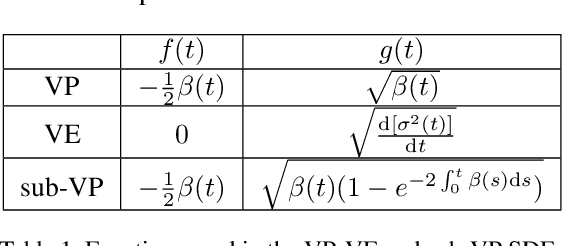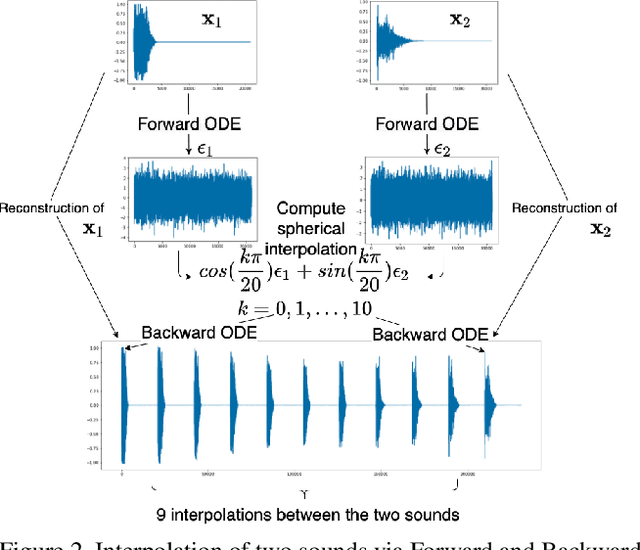Simon Rouard
Continuous Audio Language Models
Sep 09, 2025Abstract:Audio Language Models (ALM) have emerged as the dominant paradigm for speech and music generation by representing audio as sequences of discrete tokens. Yet, unlike text tokens, which are invertible, audio tokens are extracted from lossy codecs with a limited bitrate. As a consequence, increasing audio quality requires generating more tokens, which imposes a trade-off between fidelity and computational cost. We address this issue by studying Continuous Audio Language Models (CALM). These models instantiate a large Transformer backbone that produces a contextual embedding at every timestep. This sequential information then conditions an MLP that generates the next continuous frame of an audio VAE through consistency modeling. By avoiding lossy compression, CALM achieves higher quality at lower computational cost than their discrete counterpart. Experiments on speech and music demonstrate improved efficiency and fidelity over state-of-the-art discrete audio language models, facilitating lightweight, high-quality audio generation. Samples are available at hf.co/spaces/kyutai/calm-samples
MusicGen-Stem: Multi-stem music generation and edition through autoregressive modeling
Jan 07, 2025



Abstract:While most music generation models generate a mixture of stems (in mono or stereo), we propose to train a multi-stem generative model with 3 stems (bass, drums and other) that learn the musical dependencies between them. To do so, we train one specialized compression algorithm per stem to tokenize the music into parallel streams of tokens. Then, we leverage recent improvements in the task of music source separation to train a multi-stream text-to-music language model on a large dataset. Finally, thanks to a particular conditioning method, our model is able to edit bass, drums or other stems on existing or generated songs as well as doing iterative composition (e.g. generating bass on top of existing drums). This gives more flexibility in music generation algorithms and it is to the best of our knowledge the first open-source multi-stem autoregressive music generation model that can perform good quality generation and coherent source editing. Code and model weights will be released and samples are available on https://simonrouard.github.io/musicgenstem/.
Audio Conditioning for Music Generation via Discrete Bottleneck Features
Jul 17, 2024Abstract:While most music generation models use textual or parametric conditioning (e.g. tempo, harmony, musical genre), we propose to condition a language model based music generation system with audio input. Our exploration involves two distinct strategies. The first strategy, termed textual inversion, leverages a pre-trained text-to-music model to map audio input to corresponding "pseudowords" in the textual embedding space. For the second model we train a music language model from scratch jointly with a text conditioner and a quantized audio feature extractor. At inference time, we can mix textual and audio conditioning and balance them thanks to a novel double classifier free guidance method. We conduct automatic and human studies that validates our approach. We will release the code and we provide music samples on https://musicgenstyle.github.io in order to show the quality of our model.
An Independence-promoting Loss for Music Generation with Language Models
Jun 04, 2024Abstract:Music generation schemes using language modeling rely on a vocabulary of audio tokens, generally provided as codes in a discrete latent space learnt by an auto-encoder. Multi-stage quantizers are often employed to produce these tokens, therefore the decoding strategy used for token prediction must be adapted to account for multiple codebooks: either it should model the joint distribution over all codebooks, or fit the product of the codebook marginal distributions. Modelling the joint distribution requires a costly increase in the number of auto-regressive steps, while fitting the product of the marginals yields an inexact model unless the codebooks are mutually independent. In this work, we introduce an independence-promoting loss to regularize the auto-encoder used as the tokenizer in language models for music generation. The proposed loss is a proxy for mutual information based on the maximum mean discrepancy principle, applied in reproducible kernel Hilbert spaces. Our criterion is simple to implement and train, and it is generalizable to other multi-stream codecs. We show that it reduces the statistical dependence between codebooks during auto-encoding. This leads to an increase in the generated music quality when modelling the product of the marginal distributions, while generating audio much faster than the joint distribution model.
Hybrid Transformers for Music Source Separation
Nov 15, 2022Abstract:A natural question arising in Music Source Separation (MSS) is whether long range contextual information is useful, or whether local acoustic features are sufficient. In other fields, attention based Transformers have shown their ability to integrate information over long sequences. In this work, we introduce Hybrid Transformer Demucs (HT Demucs), an hybrid temporal/spectral bi-U-Net based on Hybrid Demucs, where the innermost layers are replaced by a cross-domain Transformer Encoder, using self-attention within one domain, and cross-attention across domains. While it performs poorly when trained only on MUSDB, we show that it outperforms Hybrid Demucs (trained on the same data) by 0.45 dB of SDR when using 800 extra training songs. Using sparse attention kernels to extend its receptive field, and per source fine-tuning, we achieve state-of-the-art results on MUSDB with extra training data, with 9.20 dB of SDR.
CRASH: Raw Audio Score-based Generative Modeling for Controllable High-resolution Drum Sound Synthesis
Jun 14, 2021



Abstract:In this paper, we propose a novel score-base generative model for unconditional raw audio synthesis. Our proposal builds upon the latest developments on diffusion process modeling with stochastic differential equations, which already demonstrated promising results on image generation. We motivate novel heuristics for the choice of the diffusion processes better suited for audio generation, and consider the use of a conditional U-Net to approximate the score function. While previous approaches on diffusion models on audio were mainly designed as speech vocoders in medium resolution, our method termed CRASH (Controllable Raw Audio Synthesis with High-resolution) allows us to generate short percussive sounds in 44.1kHz in a controllable way. Through extensive experiments, we showcase on a drum sound generation task the numerous sampling schemes offered by our method (unconditional generation, deterministic generation, inpainting, interpolation, variations, class-conditional sampling) and propose the class-mixing sampling, a novel way to generate "hybrid" sounds. Our proposed method closes the gap with GAN-based methods on raw audio, while offering more flexible generation capabilities with lighter and easier-to-train models.
 Add to Chrome
Add to Chrome Add to Firefox
Add to Firefox Add to Edge
Add to Edge